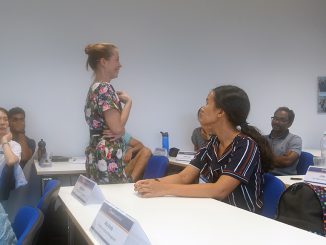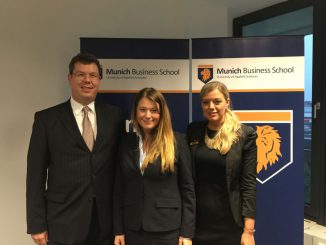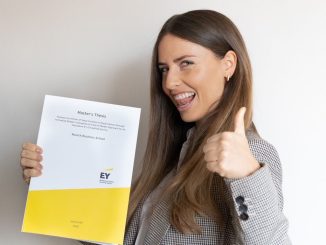Wiebke Lehnert: It’s so cool that you’ve been able to make it work and that you can experience internationality not only in your studies or elsewhere in your free time but also directly through your sport. I think that’s great. Well, let’s return to the less rosy aspects of it all. Heiner and Max, you’ve already mentioned injuries and you both decided to leave professional sport behind you in 2018, in part because of injuries. I can well imagine that it must have been a difficult, emotional step. How did you prepare yourselves for it? Did you always know that you wanted to continue your academic education with a master’s degree? And why did you choose MBS?
Max Maas: Well, I’ll start. I have to say that, looking back, I was lucky that the decision was taken out of my hands because my knee had been severely inflamed for five years. I’d tried various treatment methods but, unfortunately, cortisone was the only one that had an effect and it deadens everything in your knee. Afterwards, my knee would always be fine for one, two, maybe three months, but you can’t keep injecting cortisone too often at the same location. They actually say you should only have it four times, but I had it six times. Then, when I visited our national team doctor, Manu Köhne in April 2018, he told me: “Max, I can’t give you any more injections. The risk is too high that, with the stress you put on it, your entire knee will blow up without you even really noticing it,” – because, as he described it, the cortisone tranquilizes it. It was a tough decision, of course, but I think that the fact it was a decision taken by somebody else, someone I trusted completely and still trust today, meant I was able to live with it. I knew he wasn’t just doing it for the sake of it but because there was no other way. At that point, I said to myself straight away: “OK, now it’s time to look forwards. We can’t change any of this, it’s just how it is.” And, building on that, it soon became clear to me that – because I was still studying for my bachelor’s degree in Kempten – I would complete it as soon as possible and then move directly on to a master’s course. I also knew – living in Germany, a country obsessed with documents and certifications – that I wanted to get the highest possible qualification I could, a master’s degree. Once I had made the decision, I started to look at where I could do it. I always wanted to remain faithful to sport because of all its emotion but, at the same time, also because of the business side of things, in terms of the finances and how does a club work, because it’s no longer sloppy and unprofessional – they’re run like real companies that generate income. But I also still wanted to stay close to the mountains, so Munich as a city and MBS as an institution with the Sports Business and Communication program was a great fit for me. That meant that I was able, as I said before, to remain faithful to sport and combine it all with business studies. It is the perfect way to exploit and combine the worlds of sport, finance and business in pursuit of my future goals, to strike out on a new path, as I see it.
Wiebke Lehnert: On the other hand, Heiner, you opted for the more general International Business master’s program. What were the motivations behind that and what opportunities do you think studying at MBS offers you? And please do share with us the story of how you moved away from professional sport.
Heiner Längst: Yes, I think it actually makes sense, because the fact that I’m studying here at Munich Business School is the result of a series of decisions I’ve made over time. The biggest decision, of course, was turning my back on elite sport and ending my professional sports career. I decided to do so in 2018, not because of an injury – thank God – but because, in sport, we always talk about short-term and long-term goals. The Winter Olympics were held in Pyeongchang in 2018 and, in truth, ever since moving to the Skiinternat in Oberstdorf I mentioned earlier, that was always our goal, both for me and for Max. And so in 2018, when my performances meant that I didn’t achieve that goal, I asked myself: “Okay, do you want to spend another four years, another Olympic cycle, trying to get there? Or do you want to concentrate on your studies?” In the period after my cruciate ligament tear, I also underwent two back operations as well as knee surgery. During that time, I always found time alongside rehab and everything else to press ahead with my bachelor’s studies and, ultimately, obtain my degree. I just realized that I had other skills outside of sport that I wanted to use and develop further. So, I took the decision in 2018 and said to myself: “OK, elite sport, that’s been a hugely defining and enjoyable ten years but now I want to focus on my career after my sports career.” I finished my bachelor’s in 2019 and then I first looked for a way to catch up on the lack of practical experience that elite sportspeople are often said to have. I was 25 at that point and many 25-year-old students had far more practical experience than I did, so I just wanted to catch up. To begin with, I completed a range of internships before heading to Australia in 2020 for another internship. It was then that I considered what my next step should be. I knew that my contract was ending – and I wanted some certainty about what my life would look like after that. It became clear to me relatively quickly that I wanted to do a master’s, even though I enjoyed working a lot – but, as Max said, it’s just helpful to have taken the necessary steps in your academic education. With this in mind, I started looking at my options for a master’s course while I was in Australia. Just like when I was thinking about how best I could combine my bachelor’s with sport back in the day, I asked myself what my next step should be to move forward. I decided on MBS as the place I would do my master’s degree in International Business. And in response to your other question about why I didn’t opt for the sport-related program and chose something rather more general instead. I’ve already mentioned that my bachelor’s degree was in International Management and I really enjoyed that. I saw a lot of places around the world through sport and I’ve always loved traveling – I still do – and I’ve always thought that this internationality, this global mindset, was very important. I try to incorporate it in everything I do. So, that’s why I decided to do a master’s degree in International Business, pretty much exactly what I studied in my bachelor’s, and expand on that further. I told myself that because sport has always been something very close to my heart, it would always be a part of me. Thanks to professional sport, I’ve gained a wide range of experience, including in relation to sponsors, in relation to in self-marketing an in realtion to various political decisions behind the scenes in elite sport. I felt very well prepared in this respect, so I wanted to learn more about the other side, the purely business side of it all. And, ultimately, the master’s program in International Business seemed like the best solution.
Wiebke Lehnert: Cool, thanks for your insight. How about you, Lucas? You’re also on the master’s program in International Business – how did you come to sign up? Is sport – to put it perhaps a little bluntly – more of a very high-level hobby for you and you want to explore other avenues professionally?
Lucas Kröger: Yes, that’s a blunt way to put it, but it’s true, more or less. I’ve said a few times that I took the decision at a really early stage and that I’d stand by it and follow through. As a result, I wasn’t faced with the decision of ending my career in professional sport and focusing completely on my career like Max and Heiner; instead, my decision was about what I wanted to study. I ended up choosing the International Business course because, like Heiner and unlike Max, I didn’t want to focus too much on sport. As Heiner described, I’ve already got plenty of expertise of meetings with sponsors, dealing with internal club matters, how everything else works together, and so on. I didn’t want to close the door to other topics outside of sport. Then there was my bachelor’s degree, which was in Business Psychology, so there was the question of whether I wanted to go further and deeper in that direction or look somewhere else. Back then, I actually planned to move into the consulting industry – even before my whole US adventure and all that. So, that was actually the main driver behind my decision to enroll on the International Business degree, obviously along with the internationality in the background which had always attracted me and which I can now continue to enjoy. So handball was, is and ultimately remains a sort of side topic in my head – but, luckily, I’ve been able to squeeze a lot out of it! (laughs)
Was that interesting? Then look forward to part 2 of the interview soon!



